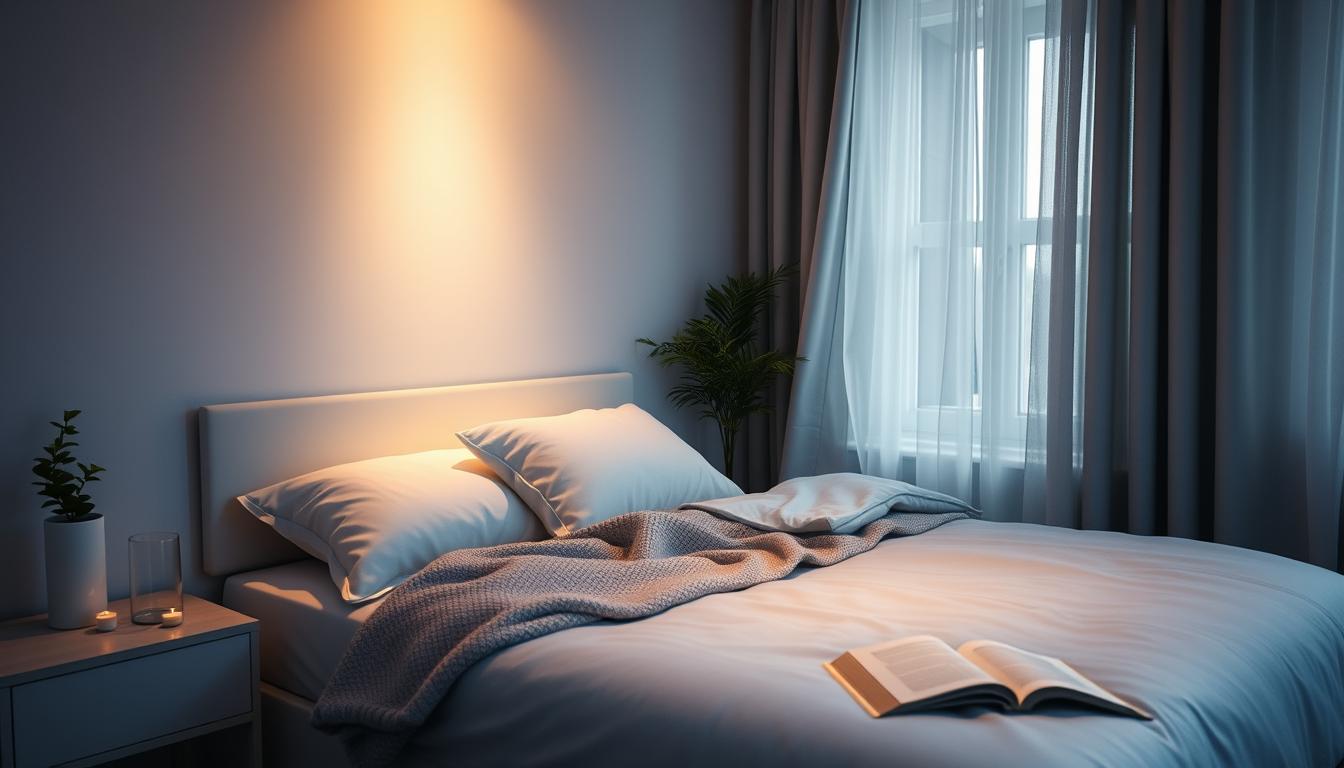Did you know that approximately 30% of Canadians report having trouble falling or staying asleep? This startling statistic underscores the pressing need for effective strategies to enhance our sleep quality. In this article, we delve into practical ways to improve sleep quality, armed with expert tips that can transform your nightly routine into a restful sanctuary. Sleep transcends mere luxury; it is fundamental to our overall health and well-being. By embracing these healthy sleep strategies, you can unlock the restorative power of sleep, leading to improved mood, enhanced productivity, and a better quality of life. Let’s explore the essential aspects of sleep quality and actionable insights that can guide you towards achieving your best rest yet!
Key Takeaways
- Understanding the importance of sleep quality in daily life.
- Creating a sleep-friendly environment is crucial for better rest.
- Consistent sleep schedules are essential for optimal sleep quality.
- Understanding the adverse effects of blue light on sleep.
- Incorporating relaxation techniques can significantly enhance sleep quality.
- Physical activity contributes positively to the ability to fall asleep.
- Consulting sleep specialists can help identify underlying sleep issues.
If you’re seeking practical tips, don’t hesitate to visit this page for more information on how to improve your sleep quality effectively.
Understanding Sleep Quality
Grasping the essence of sleep quality is paramount for those aiming to elevate their health and happiness. It encompasses not just the length of sleep but also its interruptions and the restfulness it imparts. Quality sleep is instrumental in bolstering physical health, sharpening mental acuity, and maintaining emotional equilibrium.
What is Sleep Quality?
Sleep quality is a personal assessment of one’s slumber experience. Several elements shape this perception, including:
- Duration of sleep
- Frequency of awakenings
- Depth of sleep
To fully appreciate the importance of sleep, it is crucial to understand its impact on health. Quality sleep is essential for bodily repair, memory consolidation, and cognitive enhancement.
Why is Sleep Important?
The importance of sleep is profound. It fortifies the immune system, regulates emotions, and contributes to longevity. Sleep is when the body mends itself, processes information, and manages hormones. Inadequate or poor-quality sleep can precipitate a myriad of health problems, including fatigue, cognitive impairment, and increased stress.
Common Sleep Disorders
Various sleep disorders can erode sleep quality. Identifying these conditions is crucial for addressing and mitigating sleep-related challenges. Some prevalent ones include:
- Insomnia
- Sleep apnea
- Restless leg syndrome
These afflictions can disrupt sleep patterns, resulting in severe consequences if untreated. A comprehensive understanding of sleep quality and these disorders facilitates more effective management strategies. For a deeper dive into sleep health, refer to this detailed guide.
Create a Sleep-Friendly Environment
Designing a sleep-friendly environment significantly impacts the quality of your rest. Adjustments such as optimising room temperature, investing in quality bedding, and minimising disturbances from noise and light can transform your sleeping space into a sanctuary for relaxation.
Optimise Room Temperature
The ideal room temperature for sleep typically ranges between 16-20°C. This temperature range helps maintain a comfortable environment that supports the body’s natural sleep cycle. Making small adjustments to your thermostat or using fans and heaters allows you to create a setting that promotes restfulness.
Invest in Quality Bedding
Choosing quality bedding is essential for enhancing comfort during sleep. Opt for memory foam mattresses, supportive pillows, and soft sheets to create an inviting sleep surface. Investing in these items contributes to a better sleep-friendly environment, allowing you to wake up feeling refreshed and energized.
Reduce Noise and Light
Minimising disturbances from noise and light can greatly affect your sleep quality. Consider using blackout curtains to block out unwanted light and installing a white noise machine to mask disruptive sounds. These simple modifications help establish a serene atmosphere conducive to uninterrupted sleep.
Establish a Consistent Sleep Schedule
The creation of a consistent sleep schedule is paramount for improving sleep quality. Regular sleep hours aid in synchronizing your body’s internal clock. This facilitates easier sleep onset and enhances waking up feeling revitalized. To achieve these benefits, it is crucial to adhere to a fixed bedtime and wake-up time, even on weekends. Such adherence is vital for maintaining a routine and ensuring your body adapts effectively to the established rhythm.
Importance of Regular Sleep Hours
Adherence to regular sleep hours fortifies the body’s natural cycles. By maintaining a consistent sleep schedule, the brain becomes adept at recognizing sleep and wake times. This predictability diminishes morning grogginess. A structured sleep plan also regulates essential bodily functions, thereby boosting overall well-being.
Tips for Maintaining a Routine
Adhering to a sleep routine can be achieved with a few straightforward strategies. Consider the following:
- Set a fixed bedtime and wake time, even on days off.
- Establish a calming pre-sleep winding-down routine.
- Avoid stimulating activities close to bedtime.
- Limit napping during the day to enhance nighttime sleep quality.
- Utilize sleep apps to track your habits and progress.
For additional guidance on adopting healthy habits, refer to the terms of use regarding sleep practices. By prioritizing a consistent sleep schedule, you’ll cultivate a positive cycle of rest and rejuvenation, enabling optimal daytime functioning.
Limit Screen Time Before Bed
As dusk descends, many are drawn to screens, leading to extended blue light exposure. This can severely disrupt the body’s natural sleep cycle. To enhance sleep quality, it is crucial to curtail screen use, particularly in the hour preceding bedtime.
The Impact of Blue Light on Sleep
Devices like smartphones, tablets, and computers emit blue light, which inhibits melatonin production. Melatonin is the hormone that governs sleep. When melatonin levels decline, falling asleep becomes arduous, and sleep patterns may become disordered. Limiting screen time can help counteract these adverse effects.
Alternative Evening Activities
Instead of indulging in social media or binge-watching, opt for calming evening activities. These can include:
- Reading a book
- Journaling your thoughts
- Practicing gentle stretching or yoga
- Listening to soothing music
These alternatives do not emit harsh blue light and can foster a more serene night’s rest.
Incorporate Relaxation Techniques
Integrating relaxation techniques into your nightly routine can significantly enhance your sleep quality. By embracing mindfulness and breathing exercises, you create a serene atmosphere that promotes restful sleep.
Mindfulness and Meditation
Mindfulness promotes a state of heightened awareness, which is conducive to relaxation. Engaging in meditation helps to calm the mind and diminish anxiety as bedtime draws near. Even brief periods of focused breathing, combined with mindfulness, can induce a state of tranquility. This makes it easier to transition into a restful sleep.
Breathing Exercises for Better Sleep
Breathing exercises are potent tools for reducing stress before bedtime. By concentrating on slow, deep inhales and gentle exhales, you activate your body’s relaxation response. This method decreases your heart rate and relaxes your muscles, ensuring a more serene state when you retire to bed.
Mind Your Diet and Caffeine Intake

Your diet and caffeine intake significantly influence your sleep quality. Dietary adjustments can lead to notable improvements in sleep. Certain foods for better sleep can expedite falling asleep and enhance the quality of your rest.
Foods That Promote Better Sleep
Integrating specific foods into your evening meals can foster an optimal sleep environment. Consider adding the following to your diet:
- Almonds
- Chamomile tea
- Fatty fish, such as salmon or tuna
- Kiwi fruit
- Oatmeal
These foods are packed with nutrients that aid in regulating sleep cycles. For a comprehensive guide on diet and sleep, refer to this resource.
When to Avoid Caffeine
To improve sleep quality, it’s crucial to avoid caffeine close to bedtime. Consuming caffeinated beverages like coffee, tea, and energy drinks in the afternoon can hinder sleep onset. It’s recommended to cease caffeine intake at least six hours before bedtime. This allows your body to relax fully and prepare for sleep. Additionally, heavy meals before bedtime can cause discomfort, making it challenging to fall asleep.
Engage in Regular Physical Activity
Incorporating regular physical activity into your daily routine can significantly enhance sleep quality. Engaging in exercise practices helps alleviate stress and anxiety, which often interfere with a restful night. Whether you prefer walking, swimming, or yoga, these activities promote overall well-being and relaxation.
Best Exercise Practices for Sleep
To maximise the benefits of regular physical activity for sleep, consider the following practices:
- Consistency is key: Aim for at least 150 minutes of moderate-intensity exercise each week.
- Choose enjoyable activities: Find exercises that you love, making it easier to stick with your routine.
- Incorporate variety: Mix cardio, strength training, and flexibility exercises for a well-rounded approach.
Timing Your Workouts
The timing of your exercise plays a crucial role in its impact on sleep quality. Engaging in vigorous workouts too close to bedtime can be stimulating and may disrupt your ability to fall asleep. Aim to complete your exercise at least:
- Three hours before bedtime for intense activities.
- One hour before bed for light stretching or yoga.
By understanding the importance of workout timing, you can enjoy the full benefits of regular physical activity in promoting a restful night’s sleep.
Manage Stress and Anxiety
Effective stress management is pivotal for achieving a restful night’s sleep. Adopting various anxiety relief techniques is crucial for promoting relaxation. Methods that calm the mind can significantly enhance sleep quality and overall well-being.
Techniques to Calm Your Mind
Several practices can help soothe anxiety and stress, making it easier to unwind before bedtime:
- Cognitive behavioural therapies: These focus on changing negative thought patterns, which can alleviate anxiety.
- Journaling: Writing down thoughts and feelings allows for emotional release and reflection.
- Time management strategies: Organising tasks can reduce the feeling of being overwhelmed.
Seeking Professional Help
For those facing persistent anxiety, seeking professional help is a beneficial option. Consulting a psychologist or therapist can provide tailored support and effective coping strategies. They can guide individuals in implementing sustainable stress management techniques, leading to a more restful sleep experience.
Explore the Benefits of Sleep Aids
Exploring sleep aids to enhance sleep quality may lead some to consider various options. Natural remedies present promising solutions, yet understanding their efficacy and appropriate use is crucial. While supplements alone may not be ideal, integrating specific natural remedies can significantly support a restful night’s sleep.
Natural Sleep Remedies
Several natural remedies can assist in achieving better sleep. Some popular options include:
- Melatonin: A hormone that regulates sleep-wake cycles, melatonin supplements may be helpful, particularly for individuals who struggle with jet lag or shift work.
- Valerian root: Commonly used for its calming effects, valerian root may reduce the time it takes to fall asleep and improve sleep quality.
- Magnesium: This essential mineral can help relax the body’s muscles and calm the nervous system, contributing to a better night’s sleep.
When to Consider Over-the-Counter Options
Over-the-counter (OTC) sleep solutions can be effective for occasional sleeplessness. Diphenhydramine, commonly found in sleep aids like Benadryl, may promote drowsiness but should be used with caution. It’s vital to assess potential side effects and the risk of dependency before incorporating OTC options into your sleep routine. More information can be found at this resource.
Track Your Sleep Patterns
Understanding and enhancing sleep quality often commences with the ability to track sleep patterns. Recognising the variability in your sleep habits allows for the identification of factors influencing a restful night. A practical method for this is maintaining a sleep diary, a personal log detailing nightly sleep experiences.
Using Sleep Diaries
A sleep diary enables you to record bedtime, wake-up times, nocturnal interruptions, and morning restfulness. Tracking these aspects can reveal patterns or behaviours harmful to sleep quality. This may lead to the discovery of habits requiring adjustment, facilitating improved rest.
Apps and Devices to Monitor Sleep
In today’s digital era, numerous sleep monitoring apps and wearable devices are available for tracking sleep patterns with high precision. Many apps offer insights into sleep cycles, providing feedback and suggestions for enhancement. These tools not only streamline sleep data logging but also encourage the adoption of healthier sleep habits. For more information on the efficacy of these trackers, explore sleep tracking methods and their effectiveness.
The Role of Melatonin
Melatonin is pivotal in regulating our sleep-wake cycles. It is synthesized by the pineal gland, acting as a sentinel for our internal clock. Its role is essential for those grappling with sleep disorders, offering a pathway to better rest.
Understanding its Function
Melatonin’s primary role is to signal the onset of sleep. By increasing melatonin levels in the evening, it aids in falling asleep more readily. It is particularly beneficial for those with delayed sleep phase syndrome or adjusting to new time zones. A well-timed melatonin supplement can significantly enhance sleep quality. This understanding empowers individuals to optimize their evening routines for improved sleep.
When and How to Use Supplements
When contemplating melatonin supplements, timing and dosage are paramount. Experts recommend taking them 30 minutes before bedtime. Initiating with a low dose allows for personalizing the dosage. Consistent use can significantly improve sleep duration and quality. Melatonin supplements can be a valuable tool for enhancing sleep, when used judiciously.
Consulting Sleep Specialists

For those grappling with sleep issues, seeking the counsel of sleep specialists is crucial. These professionals are adept at uncovering the root causes of sleep disruptions. Their expertise leads to not only a deeper understanding of sleep challenges but also to personalized strategies for improvement.
Identifying Underlying Issues
Sleep specialists employ sophisticated methods to diagnose sleep disorders. This journey starts with a comprehensive evaluation, encompassing discussions on sleep habits, lifestyle, and any enduring symptoms. Accurately pinpointing the underlying causes enables the development of targeted treatments, thereby enhancing sleep quality.
What to Expect in a Sleep Study
A sleep study, or polysomnography, is a common tool in the arsenal of sleep specialists. This procedure tracks various physiological activities, such as brain activity, oxygen saturation, and heart rhythm. Familiarity with the sleep study process can help mitigate any apprehension. Typically, participants are placed in a serene setting, where technicians ensure the smooth operation of all equipment. Proper preparation for this study is essential, as it significantly influences the subsequent management of sleep health. For more details on privacy and data handling during these consultations, refer to this policy.
Conclusion: Embrace Healthy Sleep Habits
In our final discussion on sleep quality enhancement, it’s crucial to acknowledge the profound impact of adopting the ten effective sleep strategies we’ve discussed. By creating a sleep-conducive environment, adhering to a consistent sleep schedule, and employing relaxation techniques, you can significantly improve your sleep habits. These actions are fundamental to enhancing your overall well-being.
The significance of diet, physical activity, and stress management in effective sleep strategies cannot be overstated. These factors play a pivotal role in achieving restorative sleep. By making conscious lifestyle choices and implementing small adjustments, you can enhance your sleep quality. This, in turn, is vital for maintaining productivity and health.
We urge you to actively pursue these habits. The journey to superior sleep is not insurmountable. By dedicating yourself to these practices and being mindful of sleep’s influence on your quality of life, you are on the path to rejuvenating rest. For further insights into sleep strategies, visit this helpful resource.
